Key takeaways:
- Research and networking are essential for effective salary negotiation; engaging with colleagues can build a realistic compensation range.
- Identifying networking opportunities through events, social media, and professional associations can lead to valuable insights and connections.
- Engaging in informational interviews provides transparency and personal stories that help shape negotiation strategies and understanding of salary landscapes.
- Collecting and analyzing salary data, and presenting it clearly with visuals and storytelling, fosters insightful discussions and empowers negotiation confidence.
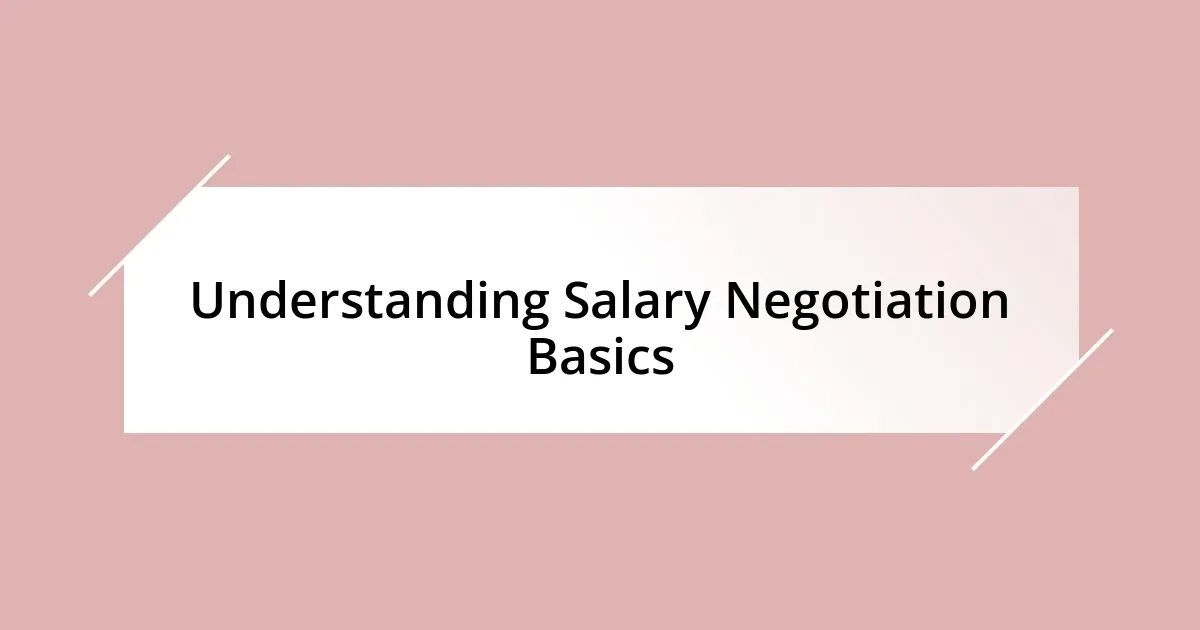
Understanding Salary Negotiation Basics
Understanding the basics of salary negotiation is crucial for any professional, and it often starts with research. When I was negotiating my first salary, I remember feeling overwhelmed by the numbers, so I reached out to colleagues in my field. They provided invaluable insights that helped me build a realistic range, and that experience made me realize how powerful networking can be in this process.
It’s vital to know your worth in the job market. Have you ever completed a project that felt particularly challenging, only to wonder if you were compensated fairly? I’ve been in those shoes, and it was only by discussing with peers that I gained clarity on how to articulate my value during negotiations.
Additionally, preparation is key. I once practiced my negotiation pitch with a trusted mentor, and it made a world of difference. I felt more confident and ready to tackle tough questions because my mentor had walked me through potential scenarios. Isn’t it comforting to have someone in your corner who can help you hone your strategy?
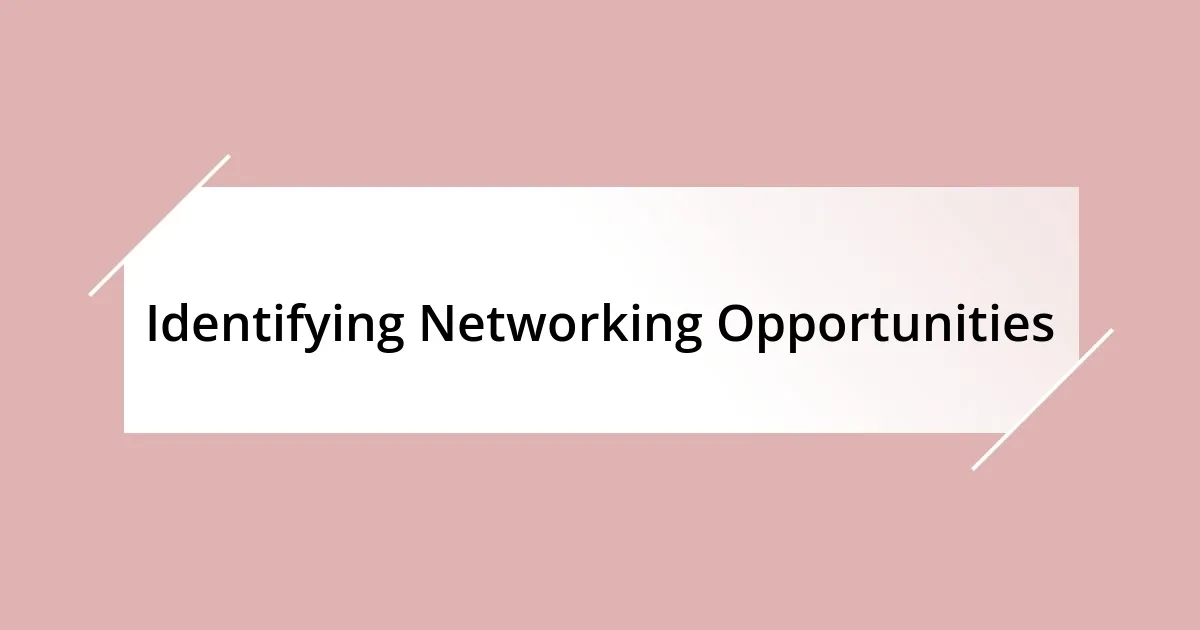
Identifying Networking Opportunities
Identifying networking opportunities can be quite a journey. I often find that some of the best connections come from unexpected places. For instance, I once struck up a conversation with a fellow attendee during a conference lunch. We shared our experiences, and he later introduced me to a valuable contact in my industry. It’s these spontaneous interactions that can lead to incredible insights and open doors for salary discussions.
To effectively spot networking opportunities, consider the following strategies:
- Attend Industry Events: Conferences, meetups, and workshops are goldmines for meeting professionals in your field.
- Utilize Social Media: Platforms like LinkedIn can help you connect with alumni or colleagues in your industry through groups or posts.
- Join Professional Associations: Memberships often provide access to exclusive events and resources for networking.
- Volunteer for Projects: Engaging in community or industry projects can expand your circle and allow you to learn from others.
- Leverage Peer Connections: Ask your colleagues about their networks; they might know someone who can offer valuable insights.
The key is to engage authentically. When I started reaching out for coffee chats, not only did I gain insights about salaries, but I also built lasting relationships. The investment in fostering those connections really pays off in the long run.
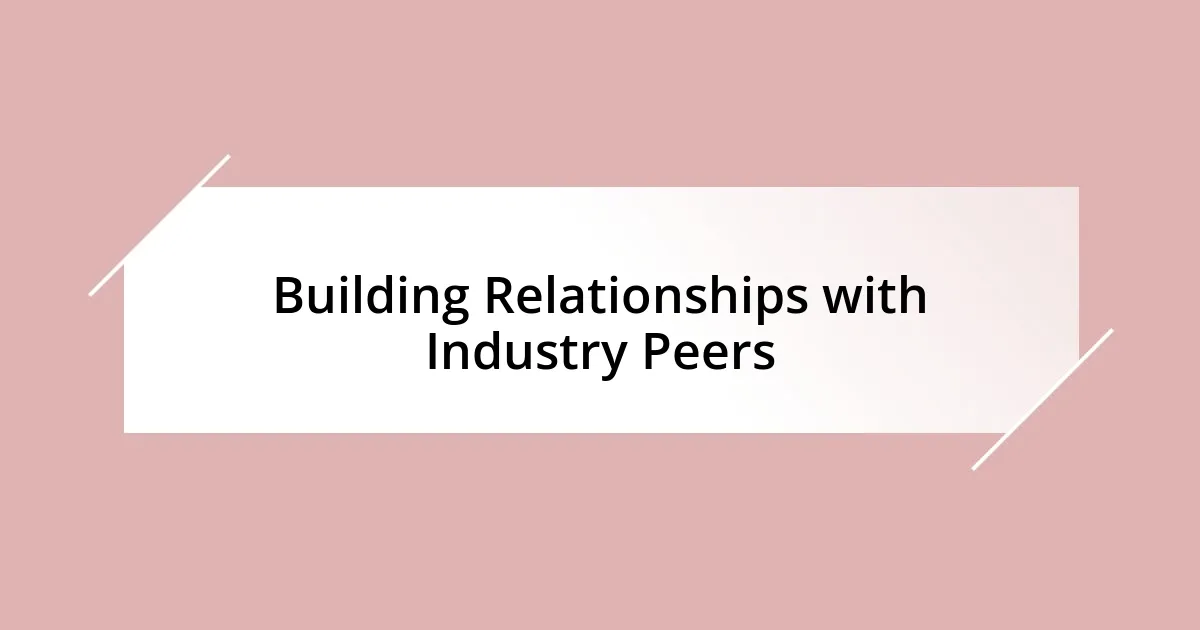
Building Relationships with Industry Peers
Building relationships with industry peers is one of the most rewarding aspects of professional growth. I remember attending a workshop where I connected with someone who shared not just career advice but also insights into their salary negotiations. It was eye-opening to hear about their experiences and strategies. Sharing these personal stories and learnings creates a sense of community, and it strengthens our understanding of the market.
As I reflect on the importance of these relationships, I realize that they often provide more than just salary insights — they offer a supportive network. I once reached out to a former colleague whom I hadn’t spoken to in years, primarily to ask about salary benchmarks. Our conversation flowed into sharing our career paths since we last connected, and this rekindled relationship resulted in several referrals for job openings I hadn’t considered. This just goes to show how nurturing these connections can yield surprising benefits.
It’s intriguing how these peer relationships can transform the way we approach salary discussions. When I joined a local professional group, I was able to engage with seasoned veterans who were willing to share their negotiations tips. Their candidness about what worked and what didn’t helped me craft my own approach. Each interaction strengthens my foundation of knowledge and confidence, making it easier for me to seek the compensation I deserve.
| Type of Interaction | Value Gained |
|---|---|
| Networking at Events | In-person connection and shared insights |
| Online Discussions | Wider perspectives and diverse experiences |
| One-on-One Coffees | Deeper relationship and tailored advice |

Leveraging Social Media for Insights
Social media, particularly LinkedIn, has completely transformed how I gather salary insights. When I initially started using LinkedIn more actively, I was surprised by how many industry professionals openly shared their salary experiences in posts or articles. This candidness encouraged me to reach out and ask for their thoughts directly. Have you ever wondered how a simple connection could provide invaluable information? It really can!
Platforms like Twitter are also great for quick exchanges and current industry trends. I remember joining in on a Twitter chat about salary negotiations hosted by a leading HR expert. It felt exhilarating to participate in real-time conversations where experts offered tips and even shared their personal stories. These exchanges not only filled my notebook with strategies but also made me feel like I was part of a bigger dialogue, connected to many who were navigating similar challenges.
Moreover, I’ve found that following specific hashtags can lead me to insightful discussions about pay scales and market trends. For example, by monitoring #SalaryTalk or #WorkplaceEquity, I stumbled upon a thread where professionals were candidly discussing their salaries in various sectors. That personal connection through a hashtag turned a casual scroll into a treasure trove of useful data. Have you tapped into social media’s potential to find your next salary insight? If not, consider diving in—it might surprise you!
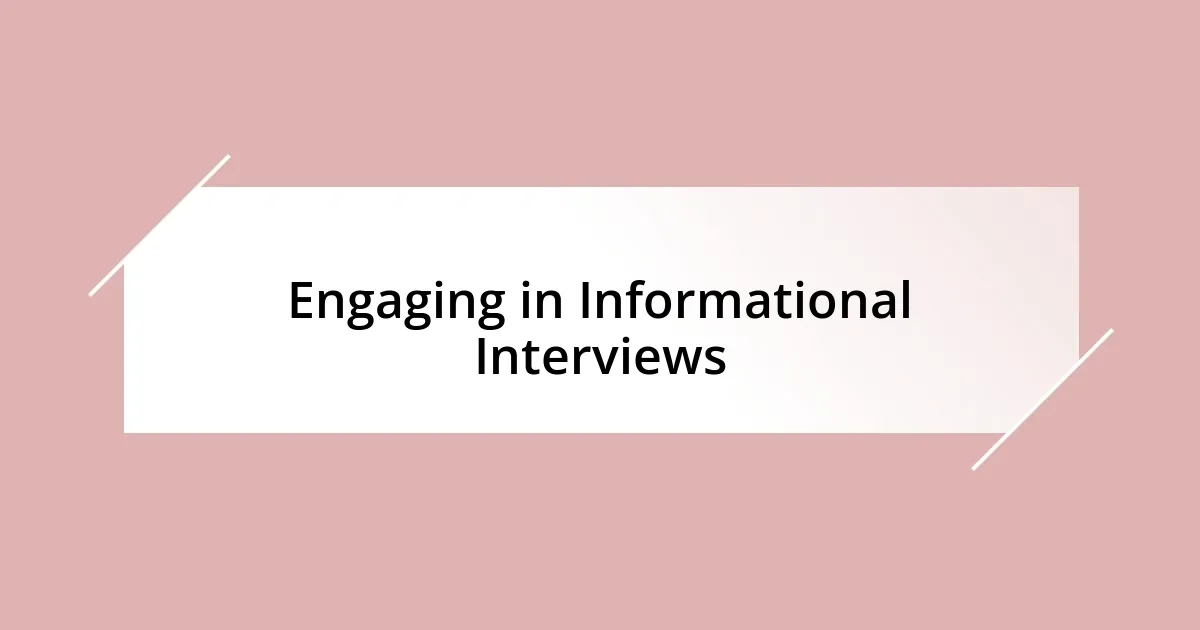
Engaging in Informational Interviews
Engaging in informational interviews has been a game changer for me in understanding salary landscapes. I recall one particular conversation with a mentor who had extensive experience in my field. As we discussed her career trajectory, she willingly shared not just her salary history but also the rationale behind her negotiation strategies. This transparency helped me view compensation discussions more holistically, rather than just a series of figures.
What struck me most during these interviews was the sincerity of the professionals I’ve spoken with; many expressed a genuine desire to help others navigate their careers. I remember chatting over coffee with an industry leader who spoke passionately about their initial struggles with salary negotiations. It made me realize that those uncomfortable conversations can often lead to clarity and improved outcomes. That’s why I always encourage others to reach out to someone they admire and ask for that deeper insight—what do you have to lose?
The real beauty of informational interviews lies in those surprising moments of connection. During a conversation with an acquaintance, we veered off-topic and ended up discussing our shared experiences with specific companies’ salary structures. This unexpected exchange unveiled information I hadn’t known, equipping me with specific data points for my future negotiations. Have you ever experienced a shift in perspective from a simple conversation? It’s truly amazing how insightful dialogues can reshape our understanding and strategy moving forward.
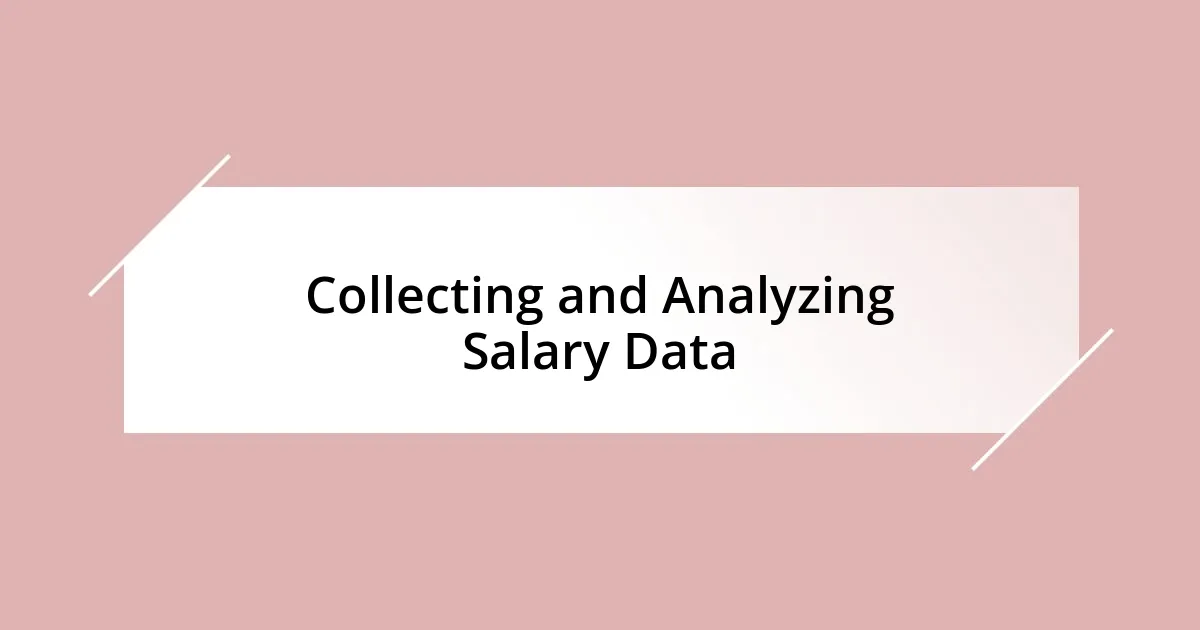
Collecting and Analyzing Salary Data
Collecting salary data can feel overwhelming, but I’ve learned that focused efforts make it manageable. One of my favorite tools for data collection is a simple spreadsheet where I track salary information gathered from various sources—online databases, conversations, and even the occasional survey I run among peers. Every entry is a story, a backdrop against which my own career unfolds. Have you ever thought about how that data could shape your understanding of your worth in the workplace?
When analyzing salary data, context is key. I remember diving into the numbers to evaluate my worth compared to industry benchmarks. It was eye-opening to realize how geographical factors, company size, and experience levels played a crucial role in determining what individuals in my field were earning. I couldn’t help but feel a mix of hope and apprehension as I compared my own salary to the averages. It was a reminder of the nuances in compensation discussions—being underpaid or unfairly compensated can be a reality for many.
As I gather insights, I also focus on trends rather than just static numbers. I often revisit my spreadsheet after a few months to cross-reference any newly acquired data, observing shifts that may hint at larger industry changes. I recall noticing a remarkable uptick in entry-level salaries over the last couple of years, sparking discussions with fellow professionals about how these trends might affect job seekers. Have you considered how such insights could influence your own salary negotiations? These reflections encourage us to think critically and act confidently as we advocate for what we deserve.
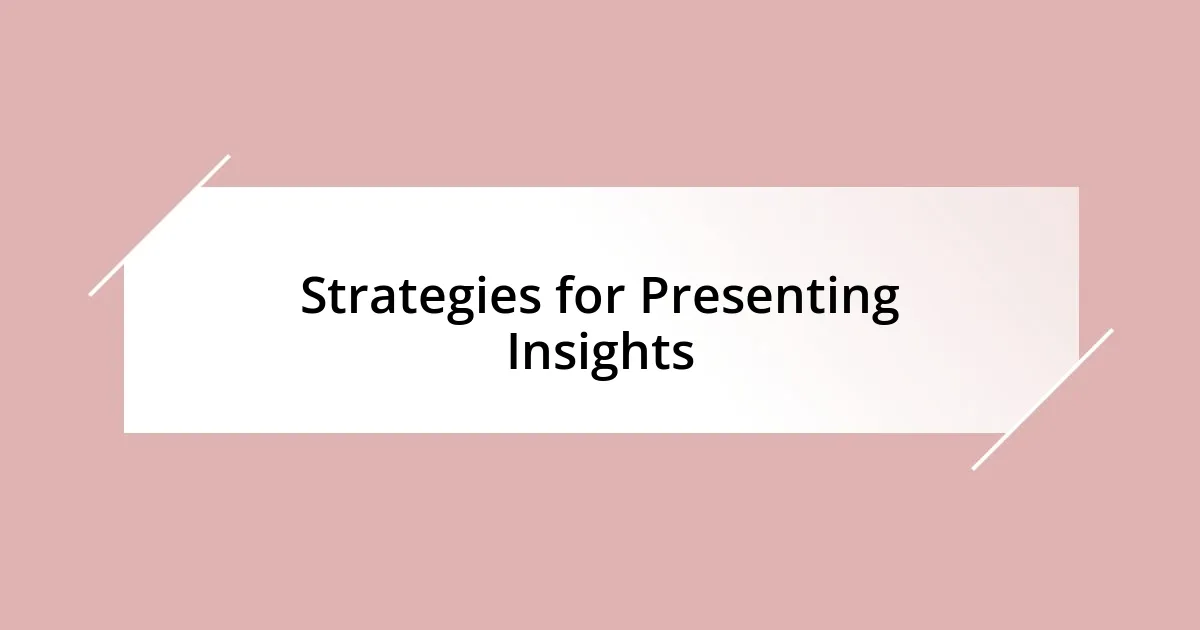
Strategies for Presenting Insights
When presenting salary insights, clarity is paramount. I often prefer to use visual aids like graphs or charts to showcase trends and comparisons clearly. I remember a particular meeting where I shared a chart illustrating salary fluctuations over the past few years; it not only captured everyone’s attention but facilitated a richer discussion about market dynamics. Have you ever noticed how visuals can turn complex data into engaging narratives that foster deeper understanding?
Storytelling can also be a powerful strategy. Rather than merely presenting figures, I tend to weave in anecdotes from my own experiences or those shared by my network. For instance, discussing how a colleague successfully negotiated a higher salary after applying specific insights I provided can make the information more relatable. This approach often prompts others to share their own stories, creating a collaborative atmosphere that is enriching for everyone involved. Isn’t it fascinating how personal narratives can ignite conversations around otherwise daunting topics like salary negotiation?
Lastly, I emphasize active participation during presentations. After sharing insights, I always encourage questions or thoughts from others in the room. Just last week, while discussing industry salary benchmarks, one participant voiced doubts about their own worth, sparking a candid discussion that revealed many shared similar uncertainties. It reinforced my belief that open dialogue can turn data into a collective knowledge resource that empowers everyone involved. Do you see the value in transforming a one-way sharing of information into a two-way conversation?














